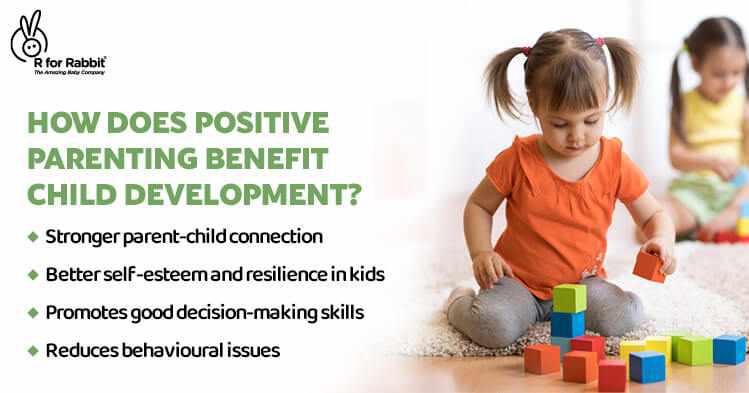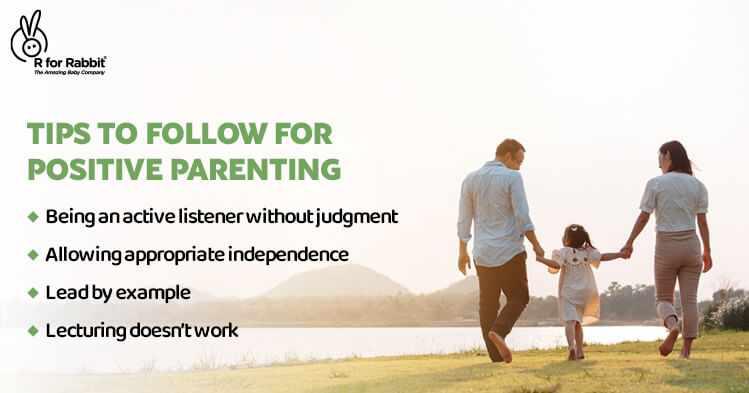What is Positive Parenting? A Nurturing Guide for Your Child

Every parent wants to nurture a child who will grow well in every aspect of life and develop a cheerful personality; however, this is not an easy task since many dimensions are involved. There may be instances when the little one will be unable to follow the guidelines, frustrating you. But you need to have patience and practice positive parenting to build a strong bond that will be fruitful in the long run.
If you are wondering what is positive parenting, and the right approach to implement it with your child, here is a detailed article with all the crucial information to help you succeed.
What is Positive Parenting?
Positive parenting is an approach where you teach and guide your child with kindness, love, and warmth. Adopting positive parenting makes your child feel encouraged and perform activities better. Your child learns to respect and trust you, creating a strong bond you will cherish forever.
However, some parents practice it incorrectly and make it accessible to the child, sometimes making the child irresponsible and ill-disciplined. Thus, you need to be aware of how to do positive parenting and define reasonable limits and empathy.
Also, you should focus on teaching your child good manners to help him grow into an upbeat personality. You need to appreciate and encourage your child even if your child cannot meet your expectations.
You should understand that learning is a continuous and time-consuming process, so even if the tiny tot does not perform up to the mark, your constant efforts and support will help him achieve the milestone.
Benefits of Positive Parenting
You will benefit from this exhaustive positive parenting guide in many ways if you practice the tips correctly.

1. Stronger parent-child connection
Every parent wants to build a bond with the child so that they feel free to share their thoughts and observations for better bonding.
2. Better self-esteem and resilience in kids
Some values need to be instilled in children since childhood, like resilience, confidence, and self-esteem. Positive parenting helps develop these life skills efficiently since you better understand your child’s readiness and capabilities.
3. Promotes good decision-making skills
When interacting well and developing better mutual understanding, your kid becomes confident and can distinguish between right and wrong. Therefore, expect your budding child to make quick and correct decisions in situations, which proves to be a fantastic skill in later life when you aren’t available to guide him.
4. Reduce behavioral issues
One major issue that is seen in growing children in present times is behavioral issues like anxiety, depression, anger, and more, which have a direct impact on their mental and physical development. Competition has increased in every field, stressing little children about unimportant things.
If you connect well with your baby, he will feel free to discuss his fears and beliefs, which makes it easy for you to handle the situation timely, reducing behavioral issues drastically and nurturing a happy child.
Also Read: Common Mistakes First Time Parents Make
Tips for Positive Parenting
Now that we have discussed the benefits of positive parenting, we also want to share some practical tips that every parent should know since the right approach makes a huge difference here. So read on, and you will be amazed to know that these tips are normal and can be easily adapted in everyday life but are also neglected due to low awareness:

● Being an active listener without judgment
Your child looks up to you for help and guidance, but if you have always pointed out his mistakes and never bothered to hear him out, eventually, he will withdraw the need and look for alternatives. Thus, the first step of positive thinking is forgetting that we only have the wisdom to differentiate between things.
This will help you be less judgmental about your child’s actions, encouraging him to talk his heart out as you patiently listen. We are not telling you to avoid highlighting the child’s mistake, but you should know the right way and keep your champ on track.
● Allowing appropriate independence
We know all parents are protective and never want their love of life to get into a problem. However, you should know when you need to interfere. Some parents love pampering their children to the extent that the little one becomes dependent on the parents for simple tasks.
Give your child some space and independence so that he is free to observe his surroundings and learn. Let him explore the world according to his IQ and interfere only when you feel your child’s next step will land him in a problem. Remember, life is the best teacher, and every person learns as he grows.
● Lead by example
You need to be the example setter for your child for every value you want him to pick up for a lifetime. Every parent is their child’s first teacher and idol, so if you show anger and fight with your partner frequently, expect your child to slowly imbibe this characteristic as his mind will process that anger is the best way to get your desired things done.
Remember, your growing angel observes your actions and listens to your words, so be careful and vigilant.
● Lecturing doesn’t work
Some parents preach right and wrong to their children, but it doesn’t positively impact your child. Instead, your child will gradually try to escape your lecture sessions as he will find them boring and inconclusive.
Instead, if you choose discussion and teaching aspects of life, you will notice a good impact as your child can convey his point of view and be involved in the learning process. So, try to pick up small learnings from your daily routine and talk to your child about their importance and the necessity to practice it for the best understanding.
Also Read: 10 Easy Indian Baby Sign Language Basics To Teach Your Little One
Strategies for Common Lifestyle and Routine Situations
The tips for positive parenting stated above are easy to incorporate into your lifestyle and routine. Below are some strategies that will help you enhance the effectiveness of the tips stated above and render better results:
● Avoid scolding and redirect your kid
We know this one is a tough job as every parent tends to lose his cool at some point since parenting is a tedious and continuous process. But still, we would like to state that scolding isn’t the right strategy. Whenever you scold or punish your child, he indirectly develops a fear. Next time, if he does the same activity by mistake, he will try to lie or hide it from you as an alternative to escape your scolding.
Thus, you should try to redirect your child and tell him why he is wrong and what will be the consequences on his life if he commits the mistake again, helping him redirect the energy and efforts in more fruitful tasks in the future.
● Giving choices to encourage cooperation
No matter how hard you try, there will be instances when both of you will have contradictory opinions and approaches. To tackle such situations, you should give the little one choice and the corresponding consequences. This will help the child understand the significance, allowing him to make wise decisions.
Still, if he sticks to his choice, let him go ahead and face the repercussions, as this will only serve as a lesson for life. In this case, you only need to monitor him so he doesn’t get into serious trouble.
● Punish the right way
Undoubtedly, punishments are an inseparable part of child nurturing, but you need to be subtle yet effective here. Whatever consequences you decide for related misbehaviour should make your child realize his mistake instead so that he does not develop a feeling of dismal that he avoids repeating his mistake in the future.
● Teach the importance of apologizing
Your child should never develop a feeling that apologizing will damage his image in front of others. Instead, he should know that it is crucial to acknowledge your mistakes and say sorry whenever you are wrong.
So, to teach the importance of apologizing, you also need to practice it with your child. Say sorry to your child or other family members whenever you do something wrong so your child learns this value with the least effort.
Key Takeaways
When we talk about positive parenting tips for toddlers and teens, as parents, you should be liable for things your child learns during his early days.
If you practice positive parenting, your relationship with your child will be very strong, and your child will never need someone else to discuss his fears or point of view, ensuring that he gets the best guidance in the world.








